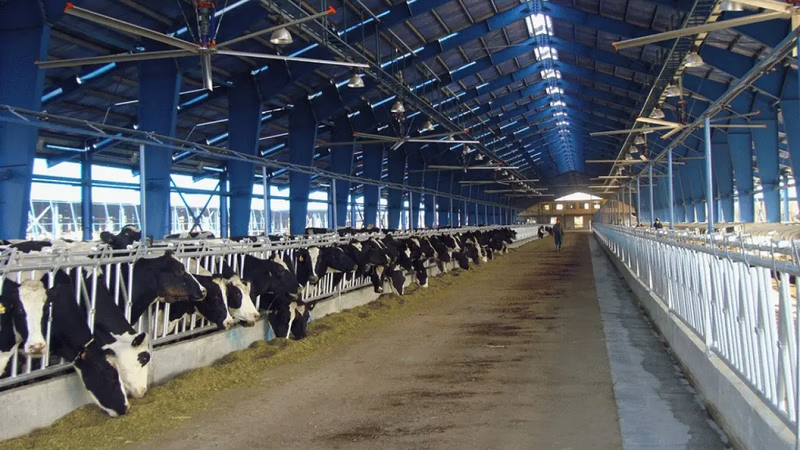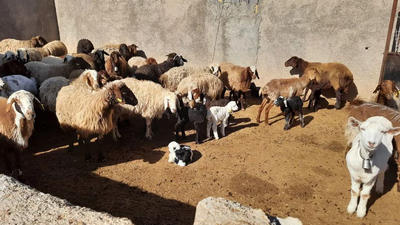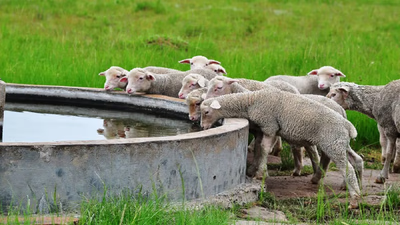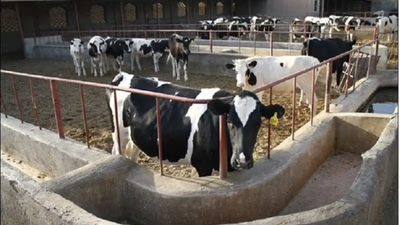
Livestock trading in Middle East markets showcases regional diversity.
Livestock trade between countries in the Middle East can be a complex matter and may be subject to certain laws and regulations. Some countries in the Middle East region have established trade agreements with each other, which can facilitate livestock trade. These agreements can determine specific conditions and rules for the import and export of livestock. Each country has its own sanitary and military laws and regulations regarding the import and export of live animals. These rules and regulations are important to maintain animal health and prevent the transmission of diseases and pest agents.
These restrictions may be considered as restrictions on the number of imports, restrictions on the type of livestock imported, or other restrictions. Each country has its own needs in terms of providing food resources and red meat . Some countries need to import live livestock due to high domestic needs and production limitations . Each country has its own rules and regulations in the field of livestock trade that must be followed. This includes sanitary, military, tariff and other restrictions. In different regions of the Middle East, livestock trade may be affected by cultural and religious restrictions. These restrictions may affect the following issues:
- Water and food restrictions : Some countries in the Middle East are facing restrictions on water resources and food products. As a result, they set rules for exporting livestock and food resources to other countries, and there may be restrictions on this.
- Religious restrictions : In some countries, there are laws and regulations that are related to halal slaughter and the provision of halal products. For the import and export of livestock and meat products, some of these religious rules and regulations may have to be observed.
- Compliance with local traditions and customs : In some regions of the Middle East, there are certain customs and traditions regarding livestock trade and the consumption of livestock products. For example, in some countries there may be certain breeds of livestock or specific methods of slaughter that must be respected.
- Restrictions on the type of livestock : Some countries may impose restrictions on the type of livestock that can be imported or exported. These restrictions may be due to health, environmental or political reasons.
- Providing domestic needs : Some countries in the Middle East need to import live livestock and livestock products due to high domestic needs and inadequate production. In these cases, there are rules and regulations to meet domestic needs while preserving local products.
It is important to note that cultural and religious restrictions on livestock trade in the Middle East are very diverse and may differ between countries and even within each country. To carry out livestock business in these areas, it is better to cooperate with local consultants and relevant authorities and follow the relevant rules and regulations carefully. Each country has its own sanitary and military laws and regulations regarding the import and export of live animals. In the field of livestock trade in the West Asian region, which includes countries such as Iraq, Saudi Arabia, Iran and Turkey , international and regional agreements can be mentioned. For example, in 2005, Iran and Iraq signed an agreement on livestock trade that sets the terms and rules for livestock trade between the two countries. In some cases, some countries may impose trade restrictions on the import of live livestock from other countries.
-

Livestock trade in the Middle East is influenced by various laws, regulations, and cultural factors. Countries in the region often establish trade agreements to facilitate the import and export of livestock, which can include specific sanitary and military regulations aimed at maintaining animal health. Each nation has unique needs for food resources, leading to varying levels of livestock imports based on domestic production capabilities. Cultural and religious considerations also play a significant role; for instance, halal slaughter requirements must be adhered to in certain countries. Additionally, restrictions may apply regarding the types of livestock that can be traded due to health or environmental concerns. Water scarcity and food resource limitations further complicate trade dynamics, prompting countries to impose rules on livestock exports. Compliance with local customs is essential for successful transactions, as traditions surrounding livestock vary widely across the region. Engaging with local consultants and authorities is advisable for navigating these complexities effectively. Notably, international agreements like the one between Iran and Iraq in 2005 illustrate collaborative efforts to streamline livestock trade within West Asia.
-

Animal husbandry is a cornerstone of the economy in West Asia, significantly impacting livelihoods and food security. The region"s arid climate necessitates reliance on livestock for income, nutrition, and cultural identity. Livestock provides essential products like meat, milk, and eggs, crucial for subsistence farming and nutrition. It also creates job opportunities for rural communities, enhancing economic stability. Furthermore, livestock ownership symbolizes wealth and social status in many societies. Environmental sustainability is another critical aspect; traditional practices help manage marginal lands while promoting biodiversity. However, challenges such as overgrazing and water scarcity threaten this sector"s sustainability. Implementing modern techniques alongside traditional methods is vital to address these issues effectively.
The integration of animal husbandry with crop farming enhances agricultural productivity by utilizing manure as fertilizer and crop residues as feed. Additionally, the export of livestock products contributes significantly to the region"s economy by generating foreign exchange and fostering trade networks. Overall, animal husbandry plays a multifaceted role in West Asia"s economy, culture, and environmental management.
-

Livestock trade is crucial for West Asia"s economy, significantly impacting local and international markets. The region"s strategic location and cultural significance of livestock make it a key trading hub. Sheep and goats dominate the trade due to their adaptability, while cattle and camels also play important roles. Poultry farming contributes to meat and egg supply. The demand for halal products drives the market, with GCC countries being major importers. Iran and Turkey are notable regional players, exporting livestock globally. Opportunities for growth exist through modern technologies in breeding and logistics, as well as expanding into new markets for halal products. However, challenges such as health standards, environmental concerns, and regulatory barriers must be addressed to ensure sustainable development in the sector. The livestock trade supports food security, employment, and cultural practices while generating revenue for national economies.
-

West Asia"s livestock trade is characterized by significant import and export activities, driven by domestic demand and cultural practices. Saudi Arabia and the UAE are the largest importers, sourcing sheep, goats, cattle, and poultry to meet their growing populations" needs for meat and dairy. Qatar and Kuwait also rely heavily on imports due to similar factors. Conversely, Turkey stands out as a leading exporter, supplying livestock products to neighboring countries in the Middle East and North Africa. Iran follows closely with its diverse agricultural base that supports livestock exports. Sudan and Somalia contribute significantly as exporters of sheep, goats, and camels during religious festivals. The trade dynamics are influenced by various factors including health regulations, logistical challenges, and environmental sustainability concerns. Countries like Iraq also participate in both importing and exporting live animals based on domestic needs.
The region"s livestock market is shaped by climatic conditions, trade policies, competition, and political influences. Ensuring compliance with health standards and navigating regulatory frameworks are essential for maintaining export markets while addressing sustainability issues in livestock farming. "




